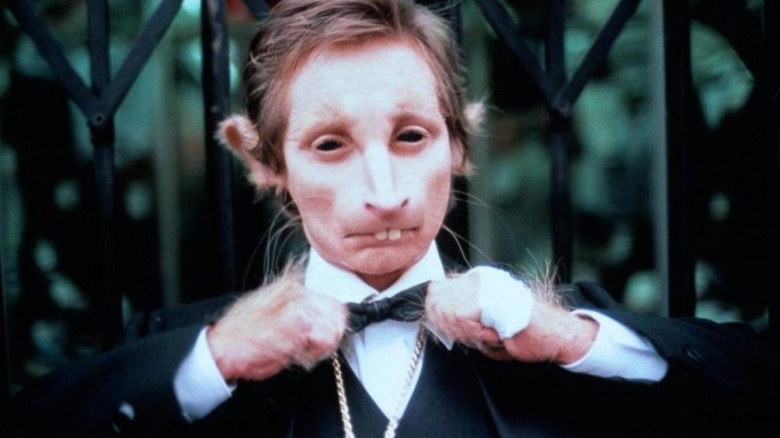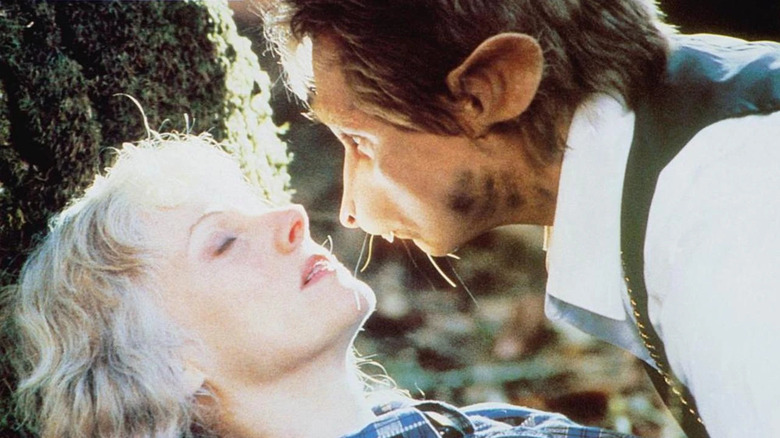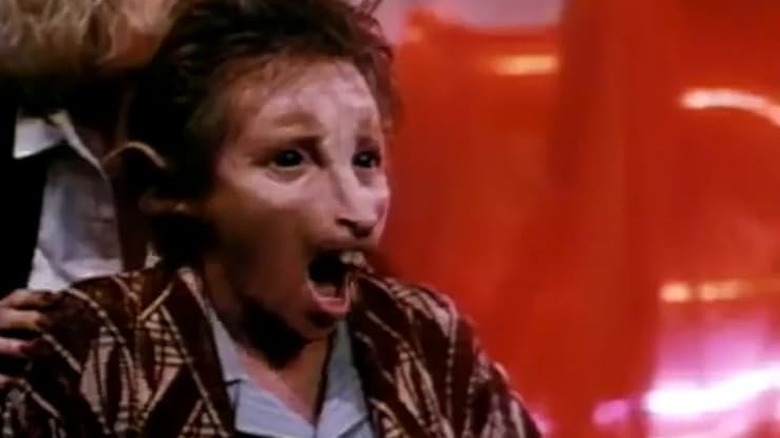The Creepy, Forgotten '80s Fantasy Movie That Clint Eastwood 'Produced' (But Really Didn't)
I assure you, this movie is real.
In 1986, Sondra Locke made her directorial debut with "Ratboy," a ridiculous fantasy film about Nikki (Locke), a former window dresser who discovers an unusual rat-person living in the landfills outside of Los Angeles. The rat boy, named Eugene, has large fuzzy ears, all-black eyes, whiskers, ratlike claws, an elongated snout, and mighty, ever-growing incisors. The makeup effects for Eugene were conceived by creature mastermind Rick Baker (famed for his work on "An American Werewolf in London," among many other films), while the actual character was physically played by actor Sharon Baird and voiced by Gordon Anderson, Locke's husband. The movie follows Nikki's attempts to pull Eugene out of his dump-dwelling life and, like in "The Elephant Man," into polite society. Eugene is depicted as skittish but sensitive, while the tone of "Ratboy" is weirdly melancholy. The film also starred Robert Townsend, Gerritt Graham, Louie Anderson, John Witherspoon, and Bill Maher.
Critics hated "Ratboy." Roger Ebert gave the film two stars and was perplexed by the fact that Eugene's origins are never explained. Was he mutated by pollution? A human who was born that way? A space alien? A gnome species of some kind? How much rat is in the man? Also, Ebert was dismayed that "Ratboy" devolved into a rote thriller, with Nikki protecting Eugene from L.A. street-level bad guys, when the film should really have been asking questions about how a ratboy would adjust to urban civilization. Locke was nominated for Worst Actress at the Razzies that year.
As one can see, "Rayboy" is a weird movie. Of course, any film this strange is also going to have a small contingent of passionate defenders. When interviewed by Coming Soon in 2015, Locke described the troubles she had getting the movie made, as well as the weird non-involvement Clint Eastwood had in the proceedings.
Ratboy is real, and Clint Eastwood was an executive producer on the film
Eastwood, it should be noted, is merely an executive producer on "Ratboy" due to the involvement of his production company, Malpaso Productions, and wasn't really involved with it beyond that. (Suffice it to say, you shouldn't expect to find this film on any rankings of Eastwood's best movies.) Not only that, but Locke and Eastwood were actually dating at the time it was made. However, before you go shouting "Scandal!," it was known, even then, that Locke's husband, Gordon Anderson, was gay, so the pair enjoyed a mutually agreed-upon living/dating situation. As such, Locke dated Eastwood from 1975 up until around 1989, during which time "Ratboy" was put into production.
As she explained to Coming Soon, Locke didn't actually want Eastwood to work on "Ratboy." It also seems Eastwood didn't want Locke to work on the movie either. To quote her directly:
"Just to be completely open about it, from the get-go, it was never a requirement from Warner Bros. that Clint's company go on as producer. I begged Clint not to be involved from the get-go because I just felt that our personal relationship was such that somehow there was going to be a problem. And directors and producers are at odds a lot, and in this case, it was compounded by the fact that in hindsight, and now that [it's] become clear to me, I believe, that he really did not want me to direct."
Locke then said that she and Eastwood butted heads over the project, with Locke presuming that Eastwood's ego was getting in the way. She intuited that the latter wanted to be the only one in the relationship who was allowed to be a director, so she directed "Ratboy" anyway, partly to spite him. His production company was involved, but no one asked him to have anything to do with the film beyond that. Really, he was as hand-off "Ratboy" as an executive producer could be. Indeed, Locke confirmed as much in a 1986 interview with the Los Angeles Times, stressing that "Ratboy" was all her.
Locke noted elsewhere in the Coming Soon interview that she didn't like to watch her own films after they've been released, so she'd distanced herself from "Ratboy" a bit since its theatrical premiere. Still, she recalled the process of actually making the movie with fondness and even remembered the genesis of its bizarro premise.
Where did Ratboy come from?
Locke explained that her movie was a dark comedy, which, at the time, was her favorite genre. As she put it:
"One of my favorite tones in a film is dark comedy. I love comedy that seems kind of a little bit absurd. You know, it is a little surreal. It is either based on parody or it's got this dark side to it. That is how I saw this piece. I saw this piece as a real, dark portrait in a way of Hollywood and the commercial world in general. And yet, at the same time, I wanted to take a slightly comedic approach to it. It just fit the bill. I love fairy tales. It's kind of a grown up fairy tale of the absurd. So, that is the way that I envisioned it. And then I started casting."
So there it is. "Ratboy" is supposed to be a semi-surreal comedy film with elements of sadness. Case in point: Locke admitted her favorite scene is one where Eugene escapes a party and flees into L.A., sad and alone. It may seem odd to modern eyes, but the mid-1980s allowed this kind of weirdo project to thrive. (This was when Tim Burton came to fame, after all.) Locke also recalled that her biggest struggle on "Ratboy" was directing and acting at the same time. She was so focused on the production that she didn't really bother to explore Nikki as a character.
In the aforementioned L.A. Times interview, Locke also pointed out that making "Ratboy" was her break-free moment. She'd gotten a lot of attention in Hollywood when she began acting, but was eventually ignored once she had "aged out." "Ratboy" allowed her to "take the bull by the horns," as she put it. This weird-ass movie was a sign of liberation.
One can rent "Ratboy" on Prime Video and Apple TV. Check it out. It's very, very strange.


